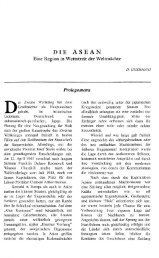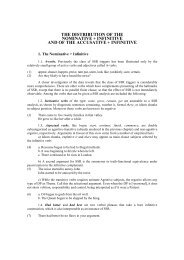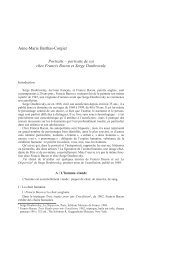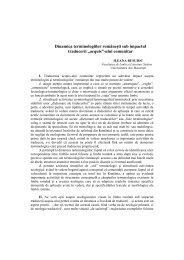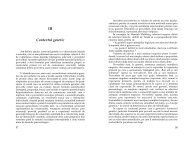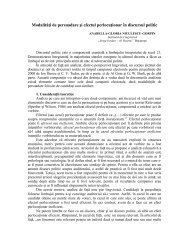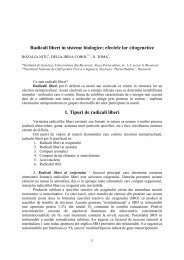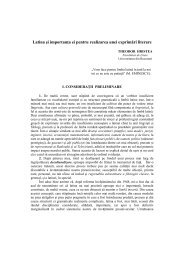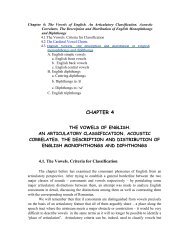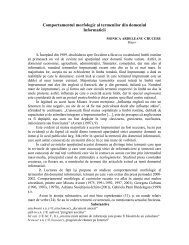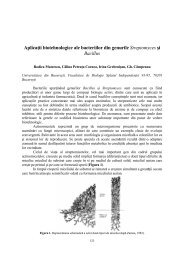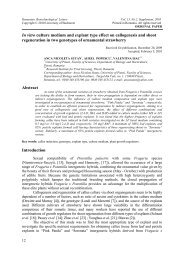- Page 1:
THE ARTIST, THE DEVIL AND THE DANDY
- Page 4 and 5:
Şos. Panduri 90-92, Bucureşti - 0
- Page 7:
TABLE OF CONTENTS INTRODUCTION ....
- Page 10 and 11:
10 The cornerstone of Wilde’s and
- Page 12 and 13:
12 he can only reproduce the fragme
- Page 14 and 15:
14 Nature’s lack of design, her c
- Page 16 and 17:
16 ˝imagination could provide a mo
- Page 18 and 19:
18 to an English tavern, as to visi
- Page 20 and 21:
20 different kind of beauty which w
- Page 22 and 23:
22 Art which deals with vice and pe
- Page 24 and 25:
24 the most perfect pleasure simply
- Page 26 and 27:
26 Courtisane. In ˝The Decay of Ly
- Page 28 and 29:
28 paintings at the Salon of 1889 e
- Page 30 and 31:
30 singular hallucinations of the f
- Page 32 and 33:
32 there is nothing really beautifu
- Page 34 and 35:
CHAPTER 1 DANDYISM Le dandy suprêm
- Page 36 and 37:
36 beautiful things. Wilde’s most
- Page 38 and 39:
38 toward the ideal in form and mor
- Page 40 and 41:
40 to be obvious is to be inartisti
- Page 42 and 43:
42 ˝Sorry to hear it, Tuppy; whene
- Page 44 and 45:
44 Symons, too, often focusses on a
- Page 46 and 47:
46 in art that the body is the soul
- Page 48 and 49:
48 Lord Henry exclaims, ˝I love ac
- Page 50 and 51:
50 abnormal (which is of course a p
- Page 52 and 53:
52 significant, not what the mask h
- Page 54 and 55:
54 The bifurcation between the inte
- Page 56 and 57:
56 Indeed Wilde was to write that
- Page 58 and 59:
58 the funeral, Pierrot gravely mee
- Page 60 and 61:
60 Plusieurs de ses affiches l’at
- Page 62 and 63:
62 often manifests evil. He is para
- Page 64 and 65:
64 that there should be an observer
- Page 66 and 67:
66 The very sharpness of the contra
- Page 68 and 69:
68 enables man to best express his
- Page 70 and 71:
CHAPTER II SATANISM Certain attainm
- Page 72 and 73:
72 entitled ˝La Révolte˝ (and in
- Page 74 and 75:
74 (perversity, for example) are go
- Page 76 and 77:
76 This concern with sin in both Wi
- Page 78 and 79:
78 mysticism to base satanism,˝ we
- Page 80 and 81:
80 These demonic Pierrots remind on
- Page 82 and 83:
82 crude commercialism of America,
- Page 84 and 85:
84 satanism. In Les Diaboliques Bar
- Page 86 and 87:
86 and the eternal pathos of the hu
- Page 88 and 89:
88 the artist. The Manicheism evinc
- Page 90 and 91:
90 ages that are being dealt with:
- Page 92 and 93:
92 being suspended between two worl
- Page 94 and 95:
94 feminine mystery. Moreau encapsu
- Page 96 and 97:
96 play, Salomé is explicitly iden
- Page 98 and 99:
98 Jokanaan, ˝and thou didst fill
- Page 100 and 101:
100 decadent rejection of reality a
- Page 102 and 103:
102 Such misogynistic sentiments ar
- Page 104 and 105:
104 her, but observes that this des
- Page 106 and 107:
106 decadent predilection for the d
- Page 108 and 109:
108 réfugier dans la pénitente ad
- Page 110 and 111:
CHAPTER III DREAMS AND FANTASY Sugg
- Page 112 and 113:
112 considered as a potential mothe
- Page 114 and 115:
114 eternity in a moment. Huysmans
- Page 116 and 117:
116 aux cimes des échalas, aux pie
- Page 118 and 119:
118 Huysmans so admired entitled hi
- Page 120 and 121:
120 Thematically, the dream enabled
- Page 122 and 123:
122 as well as an affirmation of th
- Page 124 and 125:
124 which no real voice has ever pi
- Page 126 and 127:
126 Huysmans also identified Moreau
- Page 128 and 129:
128 the obvious precursor of this t
- Page 130 and 131:
130 frowned and looked very severe,
- Page 132 and 133:
132 Woman, in her primal essence, a
- Page 134 and 135:
134 He gazes at the . . . spaces in
- Page 136 and 137:
136 voyages by decorating his room
- Page 138 and 139:
138 maddened by desire, crazed by a
- Page 140 and 141:
140 Perhaps more than any other art
- Page 142 and 143:
142 creation of the self or the exp
- Page 144 and 145:
144 Redon not only focussed on the
- Page 146 and 147:
146 direct translation or interpret
- Page 148 and 149:
148 Jacques awakens and the dream i
- Page 150 and 151:
150 Esther éclatât comme une myst
- Page 152 and 153:
152 autres se présentaient aussit
- Page 154 and 155:
154 The Surrealists took this a ste
- Page 156 and 157:
156 stimulating him, then inducing
- Page 158 and 159:
158 workings of the mind and psycho
- Page 160 and 161:
160 CHAPTER IV ART AND ARTISTS Art
- Page 162 and 163:
162 and Huysmans’ repeated emphas
- Page 164 and 165:
164 unconscious work. I wrote it wi
- Page 166 and 167:
166 which the unity of the book is
- Page 168 and 169:
168 Que le style n’est en art qu
- Page 170 and 171:
170 admiration for the purely decor
- Page 172 and 173:
172 Huysmans speaks approvingly of
- Page 174 and 175:
174 ˝What is true about music,˝ W
- Page 176 and 177:
176 intellectually and emotionally
- Page 178 and 179:
178 wonderfully beautiful figures r
- Page 180 and 181:
180 of thought and emotion and auto
- Page 182 and 183:
182 nouveau.˝ 478 Wilde similarly
- Page 184 and 185:
184 In his art criticism Huysmans h
- Page 186 and 187:
186 the masses. However, he similar
- Page 188 and 189:
188 comprehensible only to minds sh
- Page 190 and 191:
190 the one means to escape and mom
- Page 192 and 193: 192 It is telling that Wilde in ˝T
- Page 194 and 195: 194 than exclusively subject matter
- Page 196 and 197: 196 Pater’s essay on Coleridge, p
- Page 198 and 199: 198 the decadent loathing of what h
- Page 200 and 201: 200 In Flaubert’s case, there was
- Page 202 and 203: 202 foreground. In ˝Salome Dancing
- Page 204 and 205: 204 Esseintes-more real than the pa
- Page 206 and 207: 206 beyond descriptive ones.˝ 528
- Page 208 and 209: 208 yeux obstinément fermés, j’
- Page 210 and 211: 210 because they were suggestive. U
- Page 212 and 213: 212 an ˝oeuf resté constamment ma
- Page 214 and 215: 214 salauderie populacière et de g
- Page 216 and 217: 216 d’analyste tout à la fois cr
- Page 218 and 219: 218 Manifestly, then, Wilde and Huy
- Page 220 and 221: 220 extinction, and by definition d
- Page 222 and 223: 222 ˝Why does she look at me with
- Page 224 and 225: 224 be quiet at all until she had h
- Page 226 and 227: 226 albeit, ˝de fautes surhumaines
- Page 228 and 229: 228 artistic success immensely. I o
- Page 230 and 231: 230 part for such interest. It is a
- Page 232 and 233: 232 unity was attained through the
- Page 234 and 235: 234 in the hands of a unique temper
- Page 236 and 237: 236 their effects. For this reason,
- Page 238 and 239: 238 thrust, which draws the eye fro
- Page 240 and 241: CHAPTER V CONCLUSION ˝Modern life
- Page 244 and 245: 268 582 Huysmans, Against Nature, p
- Page 246 and 247: 270 Camus, Albert. Discours de Sué
- Page 248 and 249: 272 ---˝Notice˝ in Les Fleurs du
- Page 250 and 251: 274 Maignon, Charles. L’Univers A
- Page 252 and 253: 276 Schopenhauer, Arthur. The World
- Page 254: 278 Tiparul s-a executat sub cda 20
- Page 258 and 259: 282 22 Ibid., p. 75. 23 Ibid., p. 7
- Page 260 and 261: 284 Chapter One: Dandyism 72 Charle
- Page 262 and 263: 286 115 The Complete Works of Oscar
- Page 264 and 265: 288 168 J. K. Huysmans, Croquis par
- Page 266 and 267: 290 215 Huysmans, Certains, p. 78.
- Page 268 and 269: 292 265 Arthur Symons, The Symbolis
- Page 270 and 271: 294 Chapter Three: Dreams and Fanta
- Page 272 and 273: 296 352 J. K. Huysmans, L’Art mod
- Page 274 and 275: 298 406 Ibid. 407 Ibid., p. 66. 408
- Page 276 and 277: 300 456 Huysmans, En Marge, p. 133.
- Page 278 and 279: 302 504 Ibid. 505 Ibid., p. 1048. 5
- Page 280 and 281: 304 555 The Complete Works of Oscar



